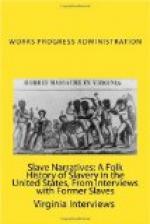“We went to the white Methodist church with slave gallery, only white preachers. We sang with the white people. The Methodists were christened and the Baptists were baptised. I have seen many colored funerals with no service. A graveyard on the place, only a wooden post to show where you were buried.
“None of the slaves ran away. I have seen and heard many patrollers, but they never whipped any of Mason’s slaves. The method of conveying news, you tell me and I tell you, but be careful, no troubles between whites and blacks.
“After work was done, the slaves would smoke, sing, tell ghost stories and tales, dances, music, home-made fiddles. Saturday was work day like any other day. We had all legal holidays. Christmas morning we went to the big house and got presents and had a big time all day.
“At corn shucking all the slaves from other plantations would come to the barn, the fiddler would sit on top of the highest barrel of corn, and play all kinds of songs, a barrel of cider, jug of whiskey, one man to dish out a drink of liquor each hour, cider when wanted. We had supper at twelve, roast pig for everybody, apple sauce, hominy, and corn bread. We went back to shucking. The carts from other farms would be there to haul it to the corn crib, dance would start after the corn was stored, we danced until daybreak.
“The only games we played were marbles, mumble pegs and ring plays. We sang London Bridge.
“When we wanted to meet at night we had an old conk, we blew that. We all would meet on the bank of the Potomac River and sing across the river to the slaves in Virginia, and they would sing back to us.
“Some people say there are no ghosts, but I saw one and I am satisfied, I saw an old lady who was dead, she was only five feet from me, I met her face to face. She was a white woman, I knew her. I liked to tore the door off the hinges getting away.
“My master’s name was Thomas Mason, he was a man of weak mental disposition, his mother managed the affairs. He was kind. Mrs. Mason had a good disposition, she never permitted the slaves to be punished. The main house was very large with porches on three sides. No children, no overseer.
“The poor white people in Charles County were worse off than the slaves; because they could not get any work to do, on the plantation, the slaves did all the work.
“Some time ago you asked did I ever see slaves sold. I have seen slaves tied behind buggies going to Washington and some to Baltimore.
“No one was taught to read. We were taught the Lord’s Prayer and catechism.
“When the slaves took sick Dr. Henry Mudd, the one who gave Booth first aid, was our doctor. The slaves had herbs of their own, and made their own salves. The only charms that were worn were made out of bones.”
Maryland 11/3/37 Rogers
Mrs. M.S. Fayman.
Reference: Personal interview with Mrs. Fayman,
at
her home, Cherry Heights near Baltimore, Md.




